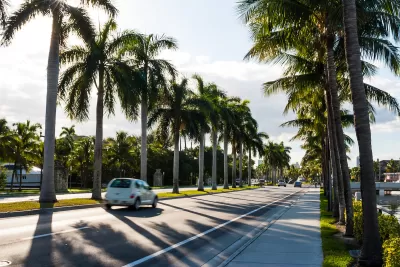The concept focuses on road design and policy that reduces the likelihood of severe injuries and deaths.

Florida is moving toward a ‘Safe System’ approach to traffic safety as road fatalities in the state rise, reports Susan Giles Wantuck for WUSF. According to Pei-Sung Lin of the Center for Urban Transportation Research at the University of South Florida, the approach acknowledges that humans make mistakes and aims to reduce the likelihood that those mistakes will be fatal.
For example, since crashes at higher speeds are more likely to result in serious injuries and deaths, designing roads with roundabouts, low speed limits, and other traffic calming features can improve safety by forcing drivers to slow down. “[F]or bike riders and pedestrians, a crash at 15 miles per hour, instead of one at 45, may be one they can survive.”
Lin also explains that “redundancy is crucial.” The article adds, “What that means is safe people, safe roads and the latter can be accomplished by providing ‘clearer signage, pavement markings, regular pavement friction, clear traffic control devices ... that also will contribute to protection of our users.’”
FULL STORY: Florida is adopting Safe System Approach to improve safety, reduce traffic deaths and severe injuries

Maui's Vacation Rental Debate Turns Ugly
Verbal attacks, misinformation campaigns and fistfights plague a high-stakes debate to convert thousands of vacation rentals into long-term housing.

Planetizen Federal Action Tracker
A weekly monitor of how Trump’s orders and actions are impacting planners and planning in America.

In Urban Planning, AI Prompting Could be the New Design Thinking
Creativity has long been key to great urban design. What if we see AI as our new creative partner?

King County Supportive Housing Program Offers Hope for Unhoused Residents
The county is taking a ‘Housing First’ approach that prioritizes getting people into housing, then offering wraparound supportive services.

Researchers Use AI to Get Clearer Picture of US Housing
Analysts are using artificial intelligence to supercharge their research by allowing them to comb through data faster. Though these AI tools can be error prone, they save time and housing researchers are optimistic about the future.

Making Shared Micromobility More Inclusive
Cities and shared mobility system operators can do more to include people with disabilities in planning and operations, per a new report.
Urban Design for Planners 1: Software Tools
This six-course series explores essential urban design concepts using open source software and equips planners with the tools they need to participate fully in the urban design process.
Planning for Universal Design
Learn the tools for implementing Universal Design in planning regulations.
planning NEXT
Appalachian Highlands Housing Partners
Mpact (founded as Rail~Volution)
City of Camden Redevelopment Agency
City of Astoria
City of Portland
City of Laramie





























